Exchange Trade - traducción de inglés de negocios PDF

| Title | Exchange Trade - traducción de inglés de negocios |
|---|---|
| Author | Julio Gómez Q. |
| Course | Administración de empresas |
| Institution | Universidad de América Latina |
| Pages | 2 |
| File Size | 37.7 KB |
| File Type | |
| Total Downloads | 108 |
| Total Views | 137 |
Summary
traducción de inglés de negocios...
Description
Trade (INTERCAMBIO) is a basic economic concept involving (QUE INVOLUCRA) the buying (COMPRA) and selling (VENTA) of goods (BIENES) and services, with compensation (COMPENSACIÓN) paid (PAGADA) by a buyer (COMPRADOR) to a seller (VENDEDOR), or the exchange (INTERCAMBIO) of goods or services between (ENTRE) parties (PARTES). Trade can take place (LLEVARSE A CABO O DESARROLLARSE) within (DENTRO) an economy between producers and consumers. International trade allows (PERMITE) countries to expand markets (MERCADOS) for both (AMBOS) (TANTO PARA) goods (BIENES) and services that otherwise (DE OTRA MANERA) may not have been available (DISPONIBLE) to it. It is the reason why a consumer can pick (ELEGIR) between a Japanese, German, or American car. As a result of international trade, the market contains (CONTIENE) greater (MÁS GRANDE) competition and therefore (POR LO TANTO), more competitive prices, which brings a cheaper (MÁS BARATO) product home to the consumer. In financial markets, trading (INTERCAMBIO) refers (SE REFIERE) to the buying and selling of securities (PRODUCTOS FINANCIEROS), such as (TALES COMO) the purchase (COMPRA) of stock (ACCIONES) on the floor (PISO) (INSTALACIONES) of the New York Stock Exchange (BOLSA DE VALORES) (NYSE). Trade broadly (DE MANERA GENERAL) refers to transactions ranging (QUE VARIAN) in complexity from the exchange of baseball cards between collectors to (HASTA) multinational policies setting (ESTABLECEN) protocols for imports and exports between countries. Regardless (SIN IMPORTAR) of the complexity (COMPLEJIDAD) of the transaction, trading is facilitated through (A TRAVÉS) three primary types of exchanges. Trading globally between nations allows consumers and countries to be exposed to goods and services not available in their own countries. Almost every kind (TIPO/ CLASE) of product can be found on the international market: food, clothes, spare (DISPONIBLE) parts, oil (PETROLEO), jewelry, wine, stocks, currencies (MONEDAS), and water. ***COIN – MONEDA EN EL SENTIDO FÍSICO ***CURRENCY – MONEDA EN EL SENTIDO DE DENOMINACIÓN Services are also traded: tourism, banking (BANCA), consulting (CONSULTORÍA), and transportation (TRANSPORTE). A product that is sold to the global market is an export, and a product that is bought from the global market is an import. For the investor, trading means expansion and growth of his business, which also means higher (MAYORES) revenues (GANANCIAS). Trade broadly refers to exchanging goods and services, most often (PRINCIPALMENTE/MAYORMENTE) in return (A CAMBIO) for money. Trade may take place within a country, or between trading nations. Economists advocate (ABOGAN / ESTÁN A FAVOR) for free trade (LIBRE COMERCIO) between nations, but protectionism such as tariffs (ARANCELES) may present themselves due to political motives, for instance (POR EJEMPLO) with 'trade wars'.
Global trade, in theory, allows wealthy countries to use their resources—whether labor, technology, or capital— more efficiently. Because countries are endowed with different assets and natural resources (land, labor, capital, and technology), some countries may produce the same good more efficiently and therefore sell it more cheaply than other countries. If a country cannot efficiently produce an item, it can obtain the item by trading with another country that can. This is known as specialization in international trade. Money, which also functions as a unit of account and a store of value, is the most common medium of exchange, providing a variety of methods for fund transfers between buyers and sellers, including cash, credit cards, and wired funds. Money’s attribute as a store of value also assures that funds received by sellers as payment for goods or services can be used to make purchases of equivalent value in the future. Cashless trades involving the exchange of goods or services between parties are referred to as barter transactions. While barter is often associated with primitive or undeveloped societies, these transactions are also used by large corporations and individuals as a means of gaining goods in exchange for excess, underutilized or unwanted assets....
Similar Free PDFs

Patrones de Modelo de Negocios
- 18 Pages
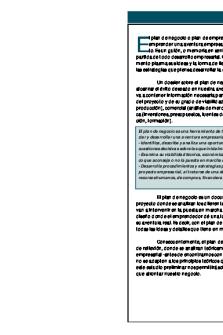
PLAN DE NEGOCIOS
- 24 Pages

El plan de negocios
- 16 Pages
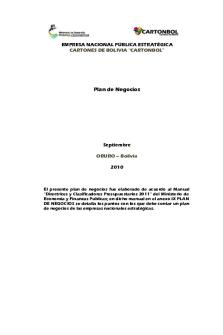
Plan de Negocios Cartonbol
- 41 Pages
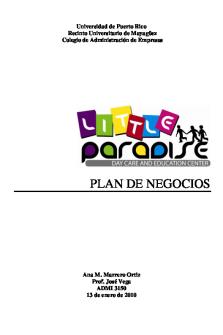
PLAN DE NEGOCIOS
- 47 Pages

Moelado de Negocios
- 15 Pages

Política de Negocios resumen
- 22 Pages

Modelo de negocios - Canvas
- 1 Pages
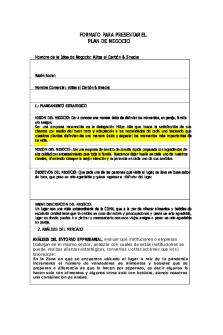
Formato-Plan-DE-Negocios
- 19 Pages
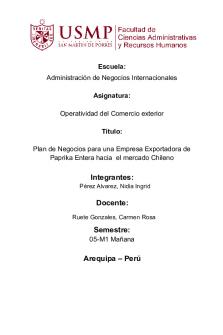
Plan de Negocios
- 14 Pages
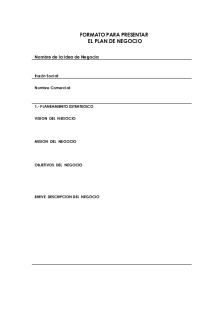
Formato PLAN DE Negocios
- 11 Pages

Gestión de negocios ajenos
- 10 Pages

Tipos de negocios
- 4 Pages

Resumen de Negocios Internacionales
- 11 Pages

Plano DE Negocios
- 20 Pages
Popular Institutions
- Tinajero National High School - Annex
- Politeknik Caltex Riau
- Yokohama City University
- SGT University
- University of Al-Qadisiyah
- Divine Word College of Vigan
- Techniek College Rotterdam
- Universidade de Santiago
- Universiti Teknologi MARA Cawangan Johor Kampus Pasir Gudang
- Poltekkes Kemenkes Yogyakarta
- Baguio City National High School
- Colegio san marcos
- preparatoria uno
- Centro de Bachillerato Tecnológico Industrial y de Servicios No. 107
- Dalian Maritime University
- Quang Trung Secondary School
- Colegio Tecnológico en Informática
- Corporación Regional de Educación Superior
- Grupo CEDVA
- Dar Al Uloom University
- Centro de Estudios Preuniversitarios de la Universidad Nacional de Ingeniería
- 上智大学
- Aakash International School, Nuna Majara
- San Felipe Neri Catholic School
- Kang Chiao International School - New Taipei City
- Misamis Occidental National High School
- Institución Educativa Escuela Normal Juan Ladrilleros
- Kolehiyo ng Pantukan
- Batanes State College
- Instituto Continental
- Sekolah Menengah Kejuruan Kesehatan Kaltara (Tarakan)
- Colegio de La Inmaculada Concepcion - Cebu
